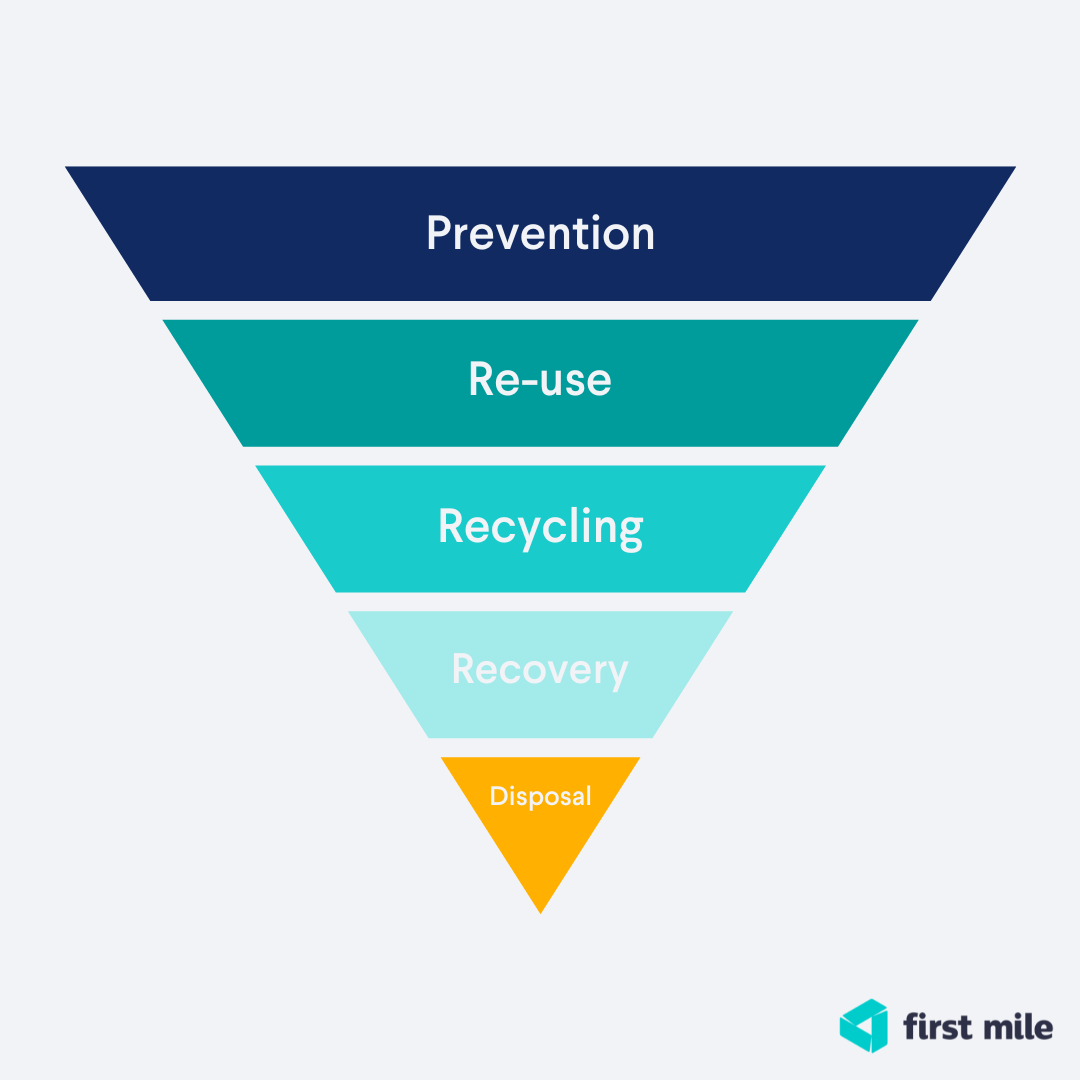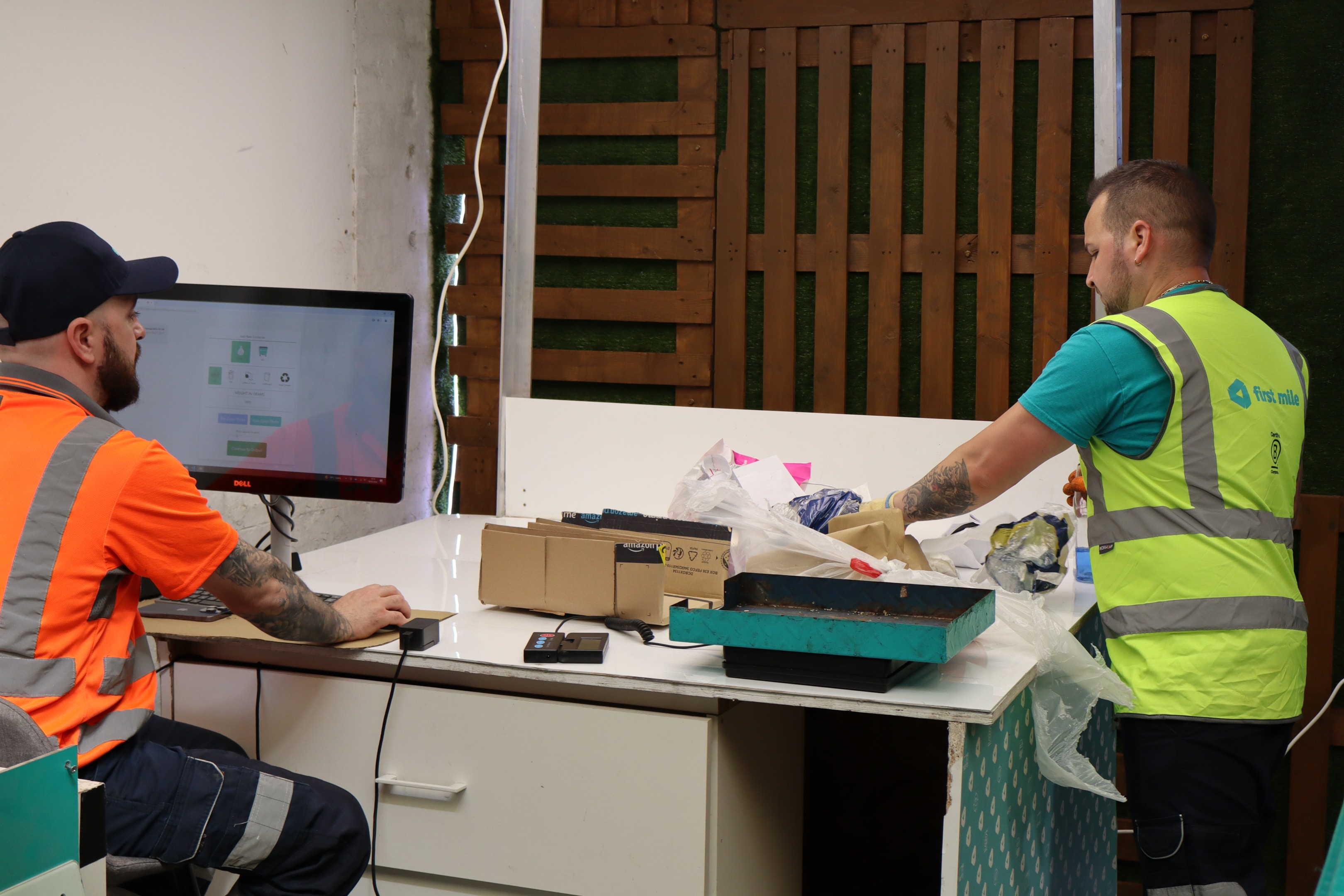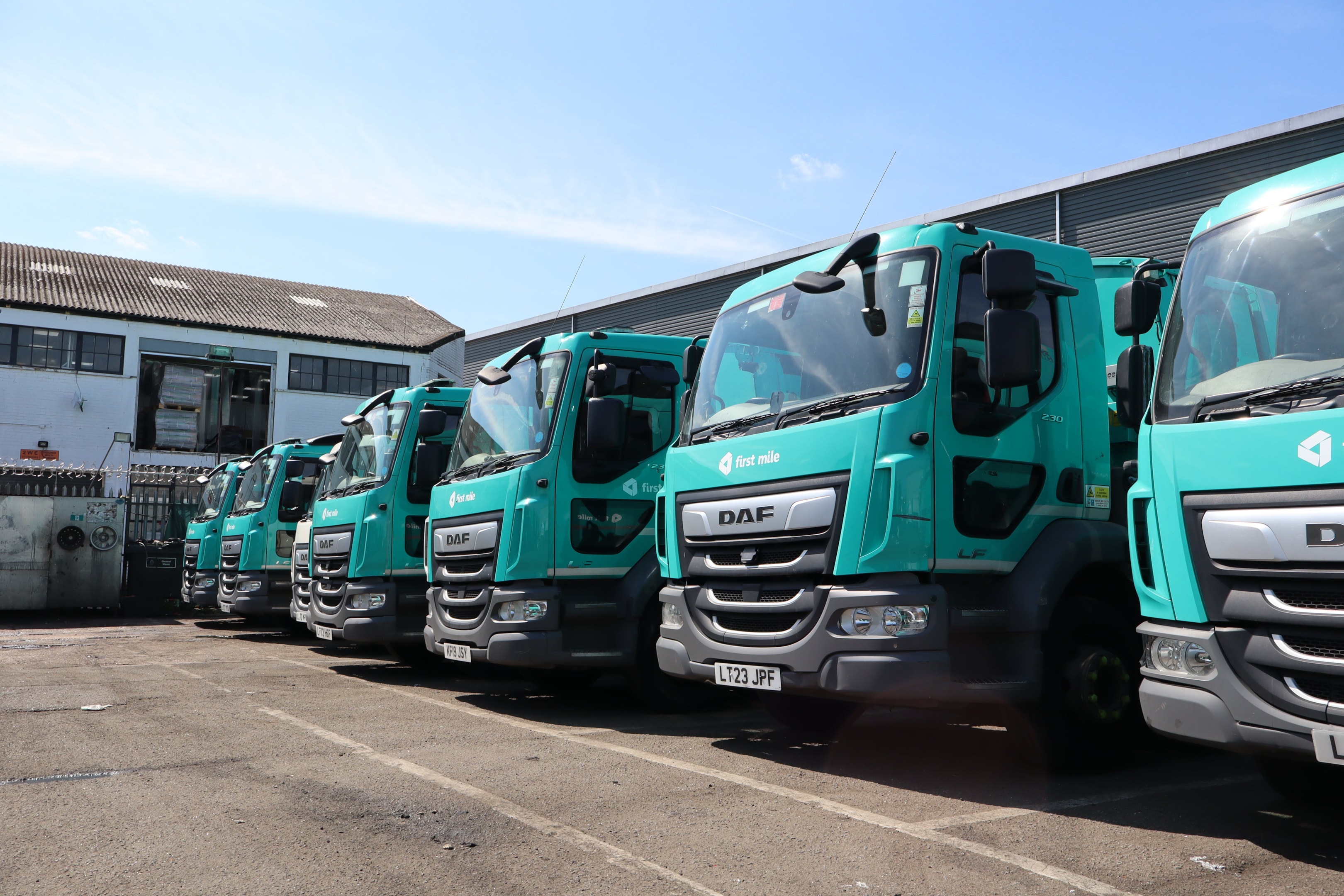You’re probably familiar with the reduce, reuse, recycle mantra to help minimise waste in the UK. For UK businesses, there are two more layers in the ‘hierarchy of waste’ - recovery and disposal.
The Waste Framework Directive (implemented by the European Union) promotes sustainable waste management practices through this hierarchy, but what is it?
What is the Waste Management Hierarchy?
This Hierarchy of Waste is a five-step framework for businesses to follow to help minimise their business waste. It helps to picture it as an inverted pyramid with the preferred options at the top, down to the least eco-friendly options at the bottom.

These five levels of the waste management hierarchy aim to guide businesses towards more sustainable waste management practices to reduce their environmental impact.
Managing waste effectively within the hierarchy means avoiding waste production and prioritising the reuse or recycling of materials before disposal.
Let’s have a look at each section of the UK waste hierarchy and see how they impact businesses and the planet.
The UK Hierarchy of Business Waste
Prevention (aka reduce):
Reduce consumption and you automatically reduce your carbon emissions and create less waste. Boom! Your use of raw materials is lower, the energy costs and pollution associated with manufacture and transportation are lower.
Lower consumption and less waste = lower costs for the business.
Preventing waste by reducing consumption is a business wide challenge. Some ways to prevent waste involve product and packaging design – reducing packaging or switching to more sustainable options; supply chain management – choosing suppliers that use minimal or reusable shipping materials; or careful stock control of perishable items to minimise wastage. Across the organisation there are likely to be opportunities to reduce and prevent waste.
Reuse:
A focus on reusing and reusable products will reduce the amount of business waste. How about re-fillable printer cartridges? Choosing glasses rather than disposable single use cups for water? Opting for refurbished office equipment and furniture. This focus on reuse means fewer raw materials to create new supplies, lowering carbon emissions and making financial savings for the business.
Recycling:
Most companies have an established process to recycle materials like glass, paper, cardboard, and some plastics. There are many more recycling streams that could be added to this and upping the recycling rate of your business prevents waste going through to the lower level of the waste hierarchy. We’re passionate about this and can talk to you about the ways recycling rates in your business can be improved.
Recycling materials saves natural resources by reducing the need for virgin materials and lowers carbon emissions. Recycling collection is a lower cost to the business than general waste disposal. Winning all round.
Recovery:
This is the use of waste materials for energy. Ideally organisations will have a much smaller proportion of their waste included here, with the first three steps in the waste hierarchy being the main focus, but inevitably there will be some. Food waste often comes under this category and the amount is likely to grow with the introduction of the Simpler Recycling Reforms. Separating collection of food waste will be a necessity under the reforms being phased in over the next few years.
Recovering energy from waste is an established industry in the UK, incinerating waste in a process that generates electricity. Using non-recyclable waste as an energy source reduces the need for fossil fuels and reduces the amount of waste going into landfill. It has a higher environmental impact that waste managed in the first three levels of the waste hierarchy, but it’s better than the final level.
Disposal:
The final level of waste management is the worst option whichever way you measure it, and it’s an option that we never use at First Mile. Disposal means waste going to landfill, or incineration without energy recovery. It’s the least sustainable option and creates the most damage environmentally.
It also costs businesses the most financially – waste disposal is more expensive than recycling – and reputationally. With companies being more transparent about their sustainability credentials, or perhaps looking to achieve B-Corp status, high levels of waste are not a good look.
No organisation would choose that negative association, so the aim should be to have zero waste in this category.
Minimising disposable waste can also save valuable space at disposal facilities, leading to more efficient waste management in the UK.
Take out waste from this bottom level and you’re instantly improving your sustainability score. At First Mile our policy is nothing to landfill, so check that your waste partner does the same or make an easy switch to us.
For companies who want to learn how to implement the waste hierarchy or know they need to reduce waste but are not sure how to do this, a Waste Audit is the starting point.
What are the most effective Waste Management practices?
Effective waste management practices are the cornerstone of reducing waste generation, conserving natural resources, and mitigating the environmental impact of waste disposal.
By adopting the waste management hierarchy, businesses can focus on waste prevention, reuse, recycling, energy recovery, and disposal in that order. Minimising the amount of waste sent to landfill sites and reducing greenhouse gas emissions.
An easy starting point is waste segregation and sorting. By separating recyclable materials from non-recyclable waste, businesses can reduce the volume of contaminated waste destined for landfill sites.
How A Waste Audit Will Reduce Waste Costs & Improve Sustainability

A waste audit will identify where your business can make changes to your waste hierarchy. The aim should be to make it more top heavy i.e. more about prevention, reuse and recycling.
Working through the waste hierarchy and finding way to improve waste management at each level is the basis of the waste audit, along with data on how your company is currently doing (waste volumes, disposal costs, recycling rates etc). At First Mile we help business owners and those responsible for sustainability or waste management carry out waste audits.
The result of the audit should be smarter buying decisions and changes in policy in the top tiers (Prevention and Reuse) through to improving recycling rates and reducing the waste that ends up in the two lower tiers – Recovery and Disposal.
These changes will mean reduced costs to the business along with improved sustainability.
Waste Hierarchy Legislation and Compliance:
The Environment Agency has the power to issue fines for not following the UK Business Waste Hierarchy so getting it right is important.
Companies have to demonstrate that they’re taking reasonable measures to apply the hierarchy in order, and upcoming legislation around recycling will help companies comply with this. For example, the Simpler Recycling reforms make it mandatory to separate dry mixed recycling and food waste. These separate collections should increase recycling rates and reduce the amount of waste going into disposal. These rules come into effect next year so businesses should be getting themselves ready and making sure their employees and their processes can manage the change.
Whilst there is legislation around the waste hierarchy, it shouldn’t just be viewed as a compliance box to tick. The framework is an opportunity for cost-cutting along with having a positive environmental impact. By focusing on waste prevention and recycling, the amount of waste in the final level is reduced, saving your business money by minimising disposal fees.
How You Can Improve Recycling Rates and Reduce Waste Costs
You might be surprised by some of the things we can recycle – have a scroll through our services page to see all the recycling streams we collect.
The Royal Opera House added eleven recycling streams after we helped them carry out a waste audit. This increased their recycling rates by 20% and reduced their amount of general waste by 30%. Well worth doing.
Adding new recycling streams means educating and engaging your employees to improve your chances of success and we can help with that too.
At City University we hosted recycling workshops for new students, along with introducing coffee cup recycling bins which helped the University improve their recycling rates.
Working with a waste partner that offers insight along with support and training is a proven way to reach sustainability targets.
And being able to communicate to buyers, investors or employees exactly how you’re measuring up is a big plus. Our Customer Portal gives our customers a way of doing just that – showing detailed recycling rates and even emission information in seconds.
Achieving Zero Waste to Landfill Status

Achieving zero waste to landfill status is an ambitious but attainable goal for businesses committed to sustainability. This requires a comprehensive approach to waste management, focusing on waste prevention, reuse, recycling, and energy recovery.
At First Mile we have a zero-to-landfill policy, where any waste that cannot be recycled is safely disposed of using waste-to-energy technologies, such as anaerobic digestion and incineration for General Waste and Food Recycling, to recover energy from waste that cannot be recycled.
Learn what happens to your waste in more detail on our General Waste and Food Recycling pages.
Improving Your Waste Hierarchy – How To Get Started
You’re reached this far so reducing your waste is obviously important to you. Maybe you’re motivated by saving money, saving the planet or just following the waste hierarchy compliance checklist. Whatever it is, we’d love to get involved and show you how we can help.
Dip a toe in with our free resources like our Business Recycling Guide and webinars. Once you’re ready to take the next step and carry out a free waste audit, get in touch. We’ve got the experience to guide you, and a record in helping all types of businesses from SMEs to multi-site chains across the UK


